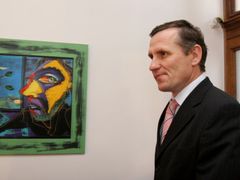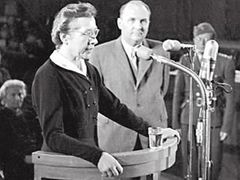LAST WEEK saw the leader of Christian Democratic Party (KDU-ČSL) and Deputy Prime Minister Jiří Čunek announce he would resign his cabinet post.
Not so much of his own volition, but rather under an intense pressure from all over after the Czech TV aired an investigative report which claimed Čunek had been depositing millions of Czech Crowns in his bank accounts while simultaneously receiving welfare in the 1990s.
Čunek went from a complete denial to the admission of the fact within the spate of days, all the time maintaining he did nothing wrong. Turns out, he was right. Legal loophole really made millionaires eligible for state financial help at the time. But the pressure was clearly too much even for Mr. Čunek who is not new to this, having survived an investigation into his alleged act of bribery earlier this year.
However, that very investigation has been renewed now, the General Attorney Renata Vesecká announced last week. The same Ms. Vesecká complained in a TV debate on Sunday that state prosecutors in the Czech Republic are clearly being abused and exploited for political motives, something she would like the Secret Service to look into, she said.
Opposition to go for the kill
Not placated, but rather energized, by Mr. Čunek´s upcoming departure from the cabinet, main opposition Social democratic Party announced on Friday they intend to force a parliamentary vote of no confidence to Prime Minister Mirek Topolánek´s ruling coalition when they get a chance one of these days.
Minister of Labor and Social Affairs Petr Nečas, Topolánek´s right hand man in the Civic Democratic Party and the cabinet, laughed the threat off in a Sunday TV debate, claiming Social Democratic leader Jiří Paroubek is undoubtedly trying to deflect attention from the murky finances of his former wife´s charity organization, which has been using his name to attract donors.
Neo-Nazis still in the fighting mood
Never-ending saga of the planned Neo-Nazi march through the streets of Prague´s old Jewish Town on the anniversary of the infamous Kristallnacht, which has been repeatedly banned by the city hall to be later allowed by a city court, continued last week with the organizers stating once again their intent to push ahead with their plans.
A number of both Jewish and non-Jewish organizations, activists and concerned citizens are also making plans to stage a counter-demonstration in the Jewish Town on the day of the planned Neo-Nazi protest (officially against the Czech military presence in Iraq, which is close to non-existent these days).
Justice delayed, but not denied
An 86-year old deaf and nearly-blind pensioner Ludmila Brožová-Polednová was sentenced to eight years in prison for complicity in murder last week by the Prague City Court. The alleged crime happened 57 years ago and took form of a judicial murder, the victim being a famous democratic politician Milada Horáková, arrested on trumped-up charges of conspiracy and treason, subjected to a scripted show trial and executed in 1950 at the age of 49 by then very young communist regime.
Ms Brožová-Polednová served as an assistant prosecutor on the Horáková trial. Her defense attorney appealed against the verdict saying her client had been in no power to influence the court´s decision in 1950, being a young and inexperienced student of law back then. Even though it is doubtful whether the defendant will ever serve the sentence, one historian called it an important act of condemnation of the brutal communist regime in the former Czechoslovakia.
Švejnar may join the race for presidential election
The US-based, Czech-born economist Jan Švejnar was only 18 when he left Czechoslovakia seeing no future for himself in the helpless country, occupied by the Soviet troops. He returned to the motherland to serve as an adviser to president Václav Havel after the communist regime was toppled in 1989. Now he is considering running for Mr. Havel´s job which will be up for grabs come next February.
However Mr. Klaus, who succeeded Mr. Havel in 2003 intends to run for re-election and is considered a favorite for the contest which is decided not by the voters but by their elected representatives in both chambers of the parliament where Mr. Klaus´s own Civic Democratic Party has the greatest share of seats.
A group of more than one hundred parliamentarians of various parties (mainly Social Democrats and the Greens) gave their support to Mr. Švejnar last week. Before giving his final word, he plans to talk to the members of a sizable communist faction in the parliament this week to see whether they may switch their allegiance in his favor. The ballot is secret but it is widely assumed it was precisely the support of the communists which helped Mr. Klaus win the post nearly five years ago.
In the meantime, results of an ongoing poll among our readers make the former Foreign Minister Jiří Dienstbier their choice number one, giving him a lead over Mr. Klaus of more than 50 thousand votes.



